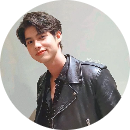When we ..............we sleep in a tent
Do you want to .......... and dance
Can he........with his new camere
Its hot !Iwant to .........in the sea ?The chocolate ones are good
You can ...... a treasure hunt at our summer camp
Isometimes ........table nis
chọn chữ thích hợp điền vào ô trông trong các từ sau đây
1.buy souvenirs
2.go to adisco
3.swim
4. gocamping
5. playgome
6. have anice cream
7.take photos
8.do





















